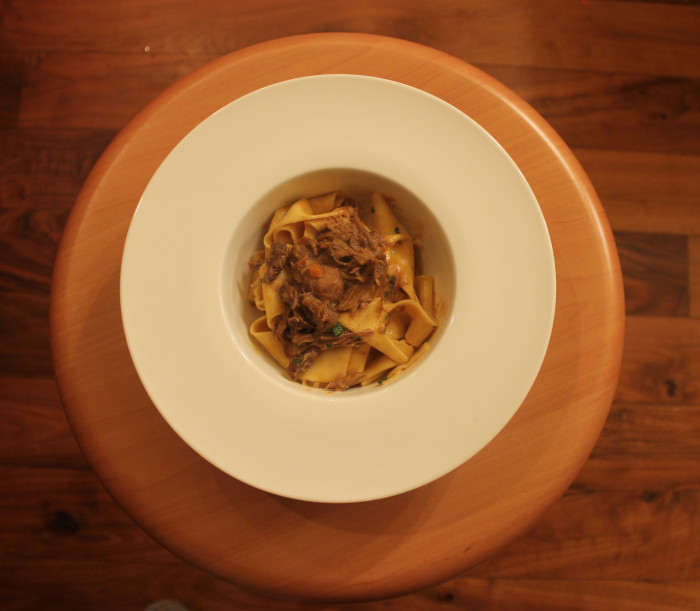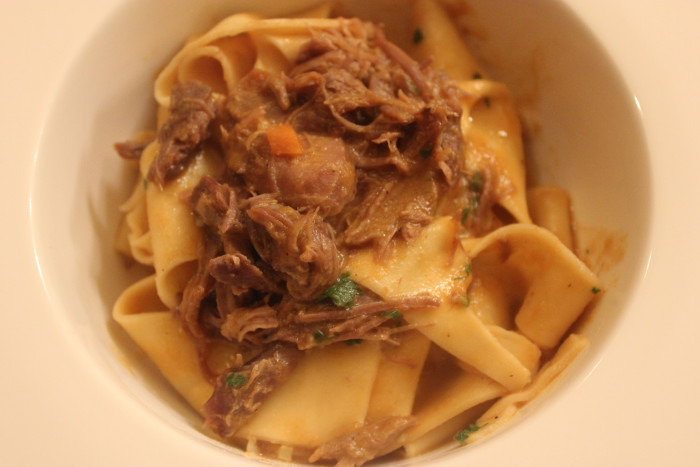This is a long week sandwiched between holidays on the Sundays at either end. It’s a busy time and one where we want to share grand food with friends and families. We had this dish for Christmas Eve and I heartily recommend it for any day during the rest of this holiday period. Or any night period.
The best thing about duck? It does not taste like chicken. It’s different and rich and wonderful when combined with pasta. The recipe, from the marvelous cookbook Battersby, is made in Battersby style: a lot prep work followed by some last-minute assembly. The prep work here includes cooking the duck. We cheated, of course, using duck confit that let us make the dish all at once. You can cheat too or be loyal to the last word of the recipe. Either way, this dish is divinely, sublimely satisfying.
Pappardelle with Duck Ragu, Olives and Madeira
Yield: Serves 5
Ingredients:
To Prep: Duck Ragu:
- 2 duck legs, fat intact
- Kosher salt
- 1 teaspoon crushed fennel seed
- 1 teaspoon crushed black peppercorns
- 2 teaspoons extra-virgin olive oil
- 1 teaspoon unsalted butter
- 1 small celery stalk, cut into large dice
- 1 small carrot, cut into large dice
- 1 small onion, cut into large dice
- 6 garlic cloves, smashed with the side of a chef’s knife and peeled
- 2 fresh thyme sprigs
- 1 bay leaf, preferably fresh 1 heaping tablespoon tomato paste
- 1 cup Madeira or sherry
- 2 tablespoons sherry vinegar
- About 3 cups chicken stock, preferably homemade
To Serve: The Pasta:
- Kosher salt
- 1 pound fresh pappardelle, homemade or store-bought
- 2 tablespoons unsalted butter
- 25 pitted Taggiasca olives or other black olives, such as Gaeta
- ½ cup finely grated Grana Padano I or Parmigiano-Reggiano cheese, plus more for serving
- 2 tablespoons extra-virgin olive oil
- Dash of sherry vinegar
- ¼ cup fines herbs or thinly sliced fresh flat-leaf parsley
Preparation:
For the duck, the night before you make the ragu, season the duck legs all over lightly with salt, and on the flesh side only, with the fennel seed and black pepper. Set in a baking dish, cover lightly with plastic wrap, and let cure in the refrigerator overnight.
The next day, preheat the oven to 325°F.
Heat a teaspoon of the oil in a medium pot over medium-high heat. Add the legs, skin-side down, and cook, turning to brown them all over, about 8 minutes total cooking time. Transfer the legs to a Dutch oven that holds them snugly but comfortably and for which you have a tight-fitting lid. Carefully drain the fat from the pan and discard it.
Heat the remaining 1 teaspoon oil with the butter in the pan in which you browned the duck legs. When the butter foams, add the celery, carrot, and onion and cook, stirring occasionally, until lightly caramelized, 10 to 12 minutes. Add the garlic, thyme, and bay leaf and cook, stirring, until fragrant but not browned, about 1 minute. Stir in the tomato paste and cook, stirring, to coat the other ingredients, 2 minutes. Pour in the Madeira, bring to a simmer, and cook until thick and syrupy about 6 minutes. Stir in the vinegar and stock and bring to a simmer.
Pour the liquid over the legs in the Dutch oven, cover, and transfer to the oven. Braise until the meat is very tender, 2 hours to 2 hours 30 minutes. During this time, periodically check to be sure the liquid is just barely simmering; if it is bubbling aggressively, reduce the oven temperature by 25°F; if not bubbling at all, raise it by 25°F.
When the duck is done, remove the pot from the oven and let the legs cool in the liquid for 1 hour. Use tongs to transfer them to a clean, dry surface and, when cool enough to handle, pick the meat from the bones and discard the skin and bones. Strain the liquid into a small pot, set over high heat, bring to a boil, and cook until reduced slightly, to a sauce consistency, about 6 minutes. Skim any fat that rises to the surface.
Use right away or refrigerate the duck in the sauce in an airtight container for up to 2 days.
For the pasta and serving, bring a large pot of salted water to a boil over high heat. Add the pappardelle and cook until al dente, 3 to 4 minutes.
Meanwhile, reheat the duck and sauce together in a large, deep sauté pan over medium heat. Swirl in 1 tablespoon of the butter, melting it. Add the olives.
Drain the pasta in a colander and add it to the pan. Toss well. Add the cheese, olive oil, vinegar, and herbs and toss. Finish by swirling in the remaining 1 tablespoon butter, melting it, and grating some more cheese over the pasta.
Divide the pasta among six plates and serve.
Source: Battersby by Joseph Ogrodnek and Walker Stern [Grand Central Life and Style, 2015]
Photo Information [Top]: Canon T2i, EFS 60mm Macro Lens, F/3.5 for 1/30th second at ISO‑500
Photo Information [Bottom]: Canon T2i, EFS 60mm Macro Lens, F/4.5 for 1/50th second at ISO‑2500


